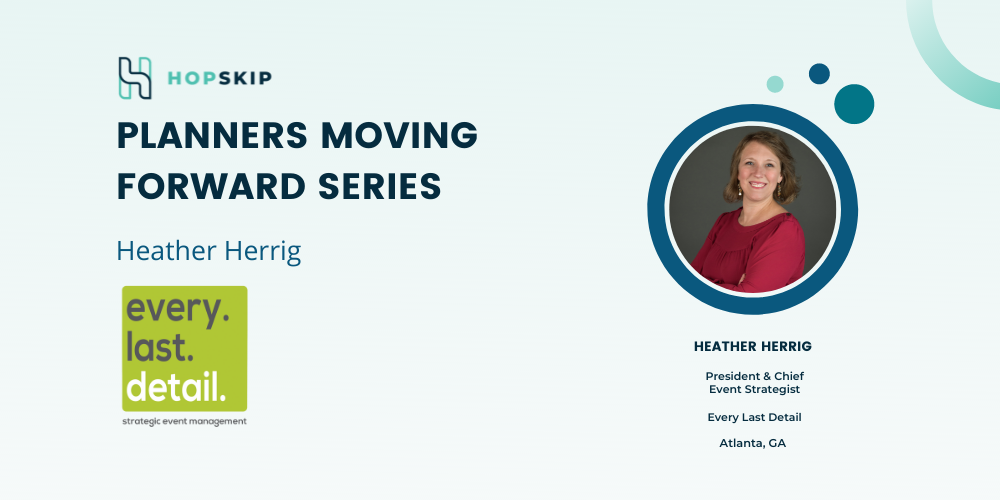This post is part of the HopSkip Planner Spotlight Series where HopSkip spotlight's planners across the industry to bring awareness of how they adapted to COVID-19, communicating and lessons learned and sharing how they are viewing the meetings and events industry in a post-pandemic world.
Name: Heather Herrig
Company Name: Every Last Detail
Job Title: President & Chief Event Strategist
Years of Experience: 17
How do you think you are positioned, after months of persevering with the pandemic, to take advantage of our new and disrupted meetings/events landscape?
After managing the true roller coaster that has been the past two years, I honestly feel prepared to tackle just about anything that comes my way – and believe me, it’s still crazy what comes up! The only known right now is that tomorrow is an unknown: Will there be a new variant? Will risk tolerance for clients shift leading to more cancellations or postponements? Will there suddenly be a shortage of clay when I was planning on custom pottery for attendee gifts (#truestory)? Whatever gets thrown my way, I do know that I am toughened and conditioned not only by the pandemic but by all of the amazing experiences I’m thankful to have had in my career, so that I can confidently face it all, one way or another.
As our community moves forward with planning in-person meetings, what new technologies or processes are you implementing that you may not have looked at before?
One of the real positives to have come from the pandemic is not necessarily new meeting and event technology but rather the shift in attitude toward technology. Virtual and hybrid are not new concepts, but out of necessity, they became viable options (and sometimes the only option) for many event hosts. This is so powerful! Whereas before, these would not necessarily have been considered, now they are part of the initial strategic planning conversation. We are equipped as event professionals to bring virtual and hybrid to the table in a way that was previously tentative at best. Accordingly, we can better collaborate as our clients expand the reach, potential, and impact of their events. Certainly advances, evolutions, mergers, etc., have happened with respect to specific technology and platforms, but I think the bigger story is how the door has been opened (and opened wide) to consider these platforms at all.
As we see virtual meetings transition back to face to face, hybrid meetings are beginning to be the vehicle to return to normalcy. What are your thoughts on hybrid meetings versus traditional fully in-person meetings?
The bottom line is incorporating a hybrid option allows you to increase your potential audience, improve accessibility, and offer dynamic programming and content. The key is to plan strategically for both your in-person audience and your virtual audience, then create authentic and engaging ways for the two audiences to interact. Just think of all the scenarios where this is already being done – sports broadcasts, awards events, talk shows, and more. There’s no reason we bring this level of creativity and vision to our events.
In your opinion, what do you think the biggest value for your attendees is in regards to returning to live events?
There will never be a true alternative to being with another human being in the same room. Gathering in person creates an unparalleled energy that is special, real, joyful, and irreplaceable. No doubt we can create experiences, content, and offerings that are meaningful and impactful to in-person or virtual audiences, and see tremendous success from an event perspective, but there is no substitute for connecting with each other in real life. Therein lies the value of in-person events, when they are safe and feasible.
As the pandemic fades away and we return to face-to-face events what do you hope changes, either for planners or hoteliers, in the traditional RFP and proposal process as a result of all of the learnings from the last 20+ months?
I honestly hope that we don’t forget the opportunities afforded by a hybrid approach – that there is power in offering events to those who can join in person and to those who can join virtually. The two options don’t have to compete. I also hope that we will appreciate each other a little more – those we are meeting and gathering with, and those who are on the service side of the hospitality industry making it all happen so beautifully. The contribution of our fellow event professionals (at all levels) is so precious, and I hope we don’t ever take that for granted.
This post is part of the HopSkip Planner Spotlight Series where HopSkip spotlight's planners across the industry to bring awareness of how they adapted to COVID-19, communicating and lessons learned and sharing how they are viewing the meetings and events industry in a post-pandemic world.
